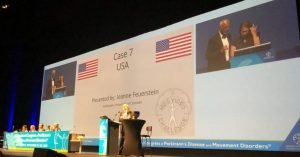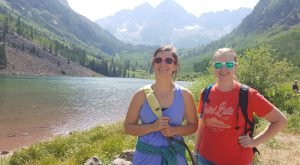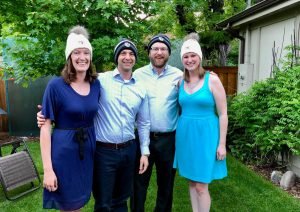Welcome!

The University of Colorado Movement Disorders Fellowship Program is a two-year program that began training fellows in 2003. The program was formalized in 2010 and a second year of training was added in 2017. To date, we have trained 24 fellows who have largely gone into academic practices, private practices in underserved areas, and private practices with clinical trial programs.
Our Movement Disorders Center was recognized as a Parkinson’s Foundation Center of Excellence in 2019. The Center is a a Huntington’s Disease Center of Excellences (designated in 2105) and a Lewy Body Dementia Research Center of Excellence (designated in 2017).
Trevor Hawkins, MD serves as the program director and is dedicated to the education of fellows. Highlighting his focus on education, Dr. Hawkins is the Clinical Specialty Director for the Department of Neurology. He also serves on the Residency Clinical Competency Committee and is the head of Movement Disorders Center Education initiatives. Dr. Hawkins was selected as the Medical Student Teacher of the Year in 2020.
About the University of Colorado Movement Disorders Center
The University of Colorado Anschutz Medical Campus (CU Anschutz) is the largest provider of comprehensive neurological and neurosurgical care in the Rocky Mountain Region. The movement disorders program serves as a major tertiary referral center for Colorado and many neighboring states. We serve over 7,000 patients annually through clinics at the University of Colorado Hospital, UCHealth satellite clinics, Denver Health Medical Center, and the Rocky Mountain Regional VA Medical Center.
The Anschutz Medical Campus is home to two of the top hospitals in the nation: University of Colorado Hospital and Children’s Hospital Colorado

The Movement Disorders Center has 11 faculty who work with our trainees closely throughout the year. Each of these team members has unique areas of clinical and research expertise within movement disorders.
Our center values a multi-disciplinary approach to patient care. The team works closely with a variety of subspecialists in clinic and educating trainees. These specialties include neurosurgeons, neuro-ophthalmologists, behavioral specialists, neuro-palliative care specialists, neuropsychologists, rehabilitation specialists, neuroradiologists, physical therapists, occupational therapists, and speech therapists.
The Movement Disorders Center is home to a very busy advanced therapies program with an experienced and collaborative team of experts. The University of Colorado Advanced Therapies for Movement Disorders (CUATMD) offers deep brain stimulation (DBS), Carbidopa-Levodopa enteral suspension (CLES), and MRI-guided focused ultrasound (MgFUS). This year our team placed 83 leads in 45 unique patients through the DBS program.
Clinical Rotations
During the first year of training, fellows rotate through movement disorders clinics under the supervision of fellowship-trained movement disorders neurologists. During these rotations, fellows are exposed to the breadth of movement disorders. During fellow clinics, patients will be seen by the fellow and an attending provider At the end of the first year of training, fellows will be experts in the following:
- recognition of movement
 disorders
disorders - differential diagnoses
- development of evaluations and treatment plans
- pharmacological management of movement disorders
- criteria for referral for advanced therapies
- administration of botulinum toxin (we train our fellows thoroughly on botulinum toxin injection techniques and overall management of muscle over-activity)
In addition to this comprehensive exposure, fellows also rotate through subspecialty clinics. These clinics include:
- Huntington’s disease Interdisciplinary Clinic
- Advanced Therapies Clinic
- Neuro-palliative Care Clinic
- Neuro-ophthalmology Clinic
- Neuro-behavior Clinic
- Underserved Populations
- Veteran’s (VA) Movement Disorders Clinic
Didactic Learning
Video Rounds | Video Rounds are held weekly and focus on the phenomenology of movement disorders and interesting cases. Fellows present videos to their peers and faculty. The discussion involves diagnostic workup, differential diagnosis, and interesting points.
 Journal Clubs | Journal clubs are held twice a month. First-year fellows present interesting or critical papers to faculty and second-year fellows. The article alternate from foundational (historical) to late-breaking. During these presentations, the fellows are expected to summarize the key points of trial design, identify strengths and weaknesses, and lead discussions about the potential impact.
Journal Clubs | Journal clubs are held twice a month. First-year fellows present interesting or critical papers to faculty and second-year fellows. The article alternate from foundational (historical) to late-breaking. During these presentations, the fellows are expected to summarize the key points of trial design, identify strengths and weaknesses, and lead discussions about the potential impact.
Program lectures | Throughout the year, faculty discuss a variety of movement disorders topics that will be essential to the fellows’ education. There is a 101 basic series at the start of the year and more advanced topics throughout the year, such as “Sharpshooters,” focused on toxin injection planning.
National Lectures | The fellows will have access and are expected to attend the virtual lecture series through the Movement Disorders Society. These generally occur weekly.
Interdisciplinary Talks | The Movement Disorders Center hosts quarterly interdisciplinary meetings. Specialists from overlapping departments and sections present topics relevant to movement disorders. Fellows help identify speakers who are of interest.
MDS Aspen Conference | Attendance at the Annual Movement Disorders Conference in Aspen is supported and encouraged for all first-year fellows. We feel this course in critical in the education of the fellows.
Customized Second Year
The second year of fellowship is curated for the fellow to achieve distinction in the fellow’s desired post-graduation area of expertise. Previous areas of in-depth training have included deep brain stimulation and other advanced therapies, research activities, medical education, or clinical areas of expertise.
During the second year, fellows will have their own clinics and see their own patients. At least one attending provider will be on site during these clinics. Fellows have the opportunity to meet weekly with attendings to discuss cases. Additionally, they have a formal, dedicated monthly opportunity to discuss cases with multiple attendings at once.
Additional Program Requirements
Research Project Requirement
Fellows are required to complete a research project during their training. At the start of their first academic year, fellows identify a faculty mentor. This mentor will help develop the fellow’s own research interests and assist in grant development. Fellows will apply for funding and IRB approval as appropriate.
The University of Colorado Department of Neurology offers many resources to help with research. Fellows will have access to this team which includes specialists in regulatory, budget, and recruitment
Outreach
Participation in outreach for other medical learners and the community ensures that fellows have a solid grasp of content and can present this information to people of various learning abilities. Fellows are required to participate in four community outreach programs each year. These can include presentations, writing newsletter articles, or speaking at symposia for patients and care partners.
DEI & Wellness
The University of Colorado Department of Neurology has shown commitment to inclusion and wellness. The department has a growing list of resources available to faculty, trainees, and staff. These resources can be provided during the interview process. Employees of the department are updated regularly with new and current resources.
To Apply to the University of Colorado Movement Disorders Fellowship

Eligibility Requirements
- Completion of a three-year approved neurology residency
- Board-certified or board-eligible in Neurology by the start of the program
- Successful completion of the USMLE/COMPLEX steps 1, 2, and 3 prior to the start of the program
- All applicants for non-ACGME fellowship programs must be eligible for and must obtain a full Colorado medical license prior to the start of the program. Licensing requirements can be found on the Department of Regulatory Agencies page:
Application Information
Application materials must be submitted through MODIF/SF Match and must include:
- Application
- CV
- 3 Letters of Recommendation
- Personal Statement
- Copy of USMLE/COMPLEX Score (1, 2, & 3) Reports
- ECFMG certification, if applicable
Applicants must register with MODIF in order to apply to our movement disorders fellowship. To register. The Match calendar is listed on the SF Match website. Applications will be received between March and June and interviews will occur from May-August.